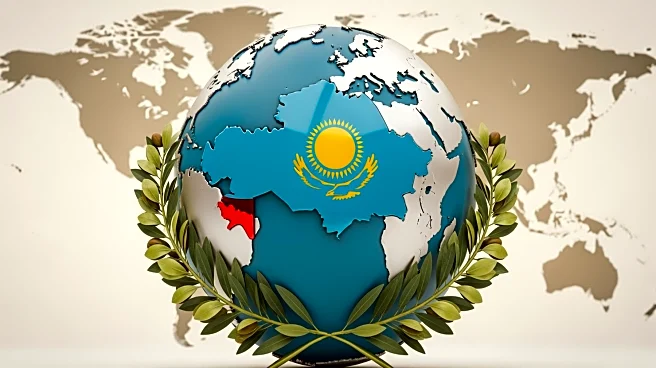What's Happening?
President Donald Trump announced that Kazakhstan will join the Abraham Accords, marking the first nation to do so during his second term. The announcement was made on Truth Social following a call with
Israeli Prime Minister Benjamin Netanyahu and Kazakh President Kassym-Jomart Tokayev. The Abraham Accords, initially brokered during Trump's first term, aimed to normalize relations between Israel and several Arab countries, including the United Arab Emirates and Bahrain. Trump emphasized that this development is a significant step toward peace and part of his broader strategy to enhance diplomatic relations between Israel and Muslim-majority nations. A formal signing ceremony with Kazakhstan is expected to occur soon, and Trump indicated that more countries are interested in joining the accords.
Why It's Important?
The inclusion of Kazakhstan in the Abraham Accords represents a strategic expansion of diplomatic relations between Israel and Muslim-majority countries, potentially fostering greater regional stability and cooperation. This move could enhance economic and political ties, offering new opportunities for trade and collaboration. For the U.S., it underscores President Trump's continued influence in international diplomacy and his commitment to expanding the accords. The participation of Kazakhstan, a significant player in Central Asia, could encourage other nations in the region to consider similar agreements, potentially reshaping geopolitical dynamics and fostering peace in historically volatile areas.
What's Next?
A formal signing ceremony between Kazakhstan and Israel is anticipated, which will officially mark Kazakhstan's entry into the Abraham Accords. This event may prompt other countries to accelerate their own diplomatic engagements with Israel, potentially leading to a broader coalition of nations under the accords. Stakeholders, including political leaders and businesses, will likely monitor these developments closely, assessing the potential for new alliances and economic partnerships. The U.S. may continue to play a pivotal role in facilitating these agreements, leveraging its diplomatic influence to encourage further participation.
Beyond the Headlines
The expansion of the Abraham Accords to include Kazakhstan could have deeper implications for regional politics and cultural exchanges. It may challenge existing narratives about Muslim-majority countries' relations with Israel, promoting a shift towards more open and cooperative interactions. This development could also influence cultural perceptions and foster greater understanding between diverse communities, potentially leading to long-term shifts in regional alliances and international relations.










